Capital IdeasTM
Investment insights from Capital Group
Market Volatility
When is the next recession?
That's one of the questions we hear most often, especially following more than a year of aggressive interest rate hikes aimed at reining in inflation. Although a recession has seemed imminent for a while, the economic picture has become muddied as industries have weakened and recovered at different times. If we do see a broad contraction, our expectation is that it will be less severe than the 2008 global financial crisis and other more typical recessions, followed by a strong recovery.
To help investors prepare for these uncertain times, we researched more than 70 years of data including the last 11 economic downturns to distill our top insights and answer key questions about recessions:
1. What is a recession?
A recession is commonly defined as at least two consecutive quarters of declining GDP (gross domestic product) after a period of growth, although that isn’t enough on its own. The National Bureau of Economic Research (NBER), which is responsible for business cycle dating, defines recessions as a “significant decline in economic activity spread across the economy, lasting more than a few months, normally visible in real GDP, real income, employment, industrial production and wholesale-retail sales.” In this guide, we will use NBER’s official dates.
2. What causes recessions?
Past recessions have occurred for many reasons, but typically are the result of economic imbalances that ultimately need to be corrected. For example, the 2008 recession was caused by excess debt in the housing market, while the 2001 contraction was caused by an asset bubble in technology stocks. An unexpected shock such as the COVID-19 pandemic, widespread enough to damage corporate profits and trigger job cuts, also can be responsible.
When unemployment rises, consumers typically reduce spending, which further pressures economic growth, company earnings and stock prices. These factors can fuel a vicious cycle that topples an economy. Although they can be painful to live through, recessions are a natural and necessary means of clearing out excesses before the next economic expansion. As Capital Group equity portfolio manager Rob Lovelace has noted: “You can’t have such a sustained period of growth without an occasional downturn to balance things out. It’s normal. It’s expected. It’s healthy.”
3. How long do recessions last?
The good news is that recessions generally haven’t lasted very long. Our analysis of 11 cycles since 1950 shows that recessions have persisted between two and 18 months, with the average spanning about 10 months. For those directly affected by job loss or business closures, that can feel like an eternity. But investors with a long-term investment horizon would be better served looking at the full picture.
Recessions are painful, but expansions have been powerful
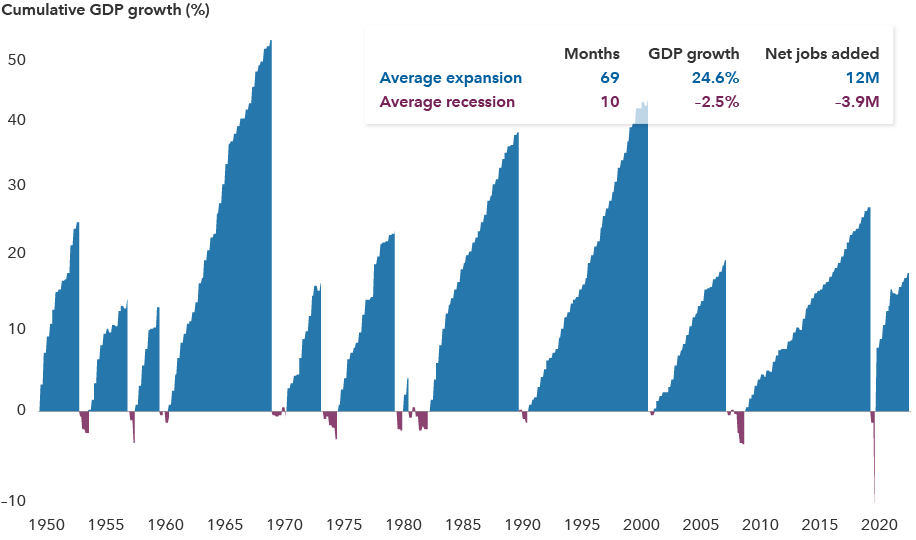
Sources: Capital Group, National Bureau of Economic Research (NBER), Refinitiv Datastream. Chart data is latest available as of 31/8/23 and shown on a logarithmic scale. The expansion that began in 2020 is still considered current as of 31/8/23 and is not included in the average expansion summary statistics. Since NBER announces recession start and end months, rather than exact dates, we have used month-end dates as a proxy for calculations of jobs added. Nearest quarter-end values used for GDP growth rates. Past results are not predictive of results in future periods.
Recessions have been relatively small blips in economic history. Over the last 70 years, the US has been in an official recession less than 15% of all months. Moreover, their net economic impact has been relatively small. The average expansion increased economic output by almost 25%, whereas the average recession reduced GDP by 2.5%. Equity returns can even be positive over the full length of a contraction since some of the strongest stock rallies have occurred during the late stages of a recession.
4. What happens to the stock market during a recession?
The exact timing of a recession is hard to predict, but it’s still wise to think about how one could affect your portfolio. Bear markets (market declines of 20% or more) and recessions have often overlapped — with equities leading the economic cycle by six to seven months on the way down and again on the way up.
Equities have typically peaked months before a recession, but can bounce back quickly
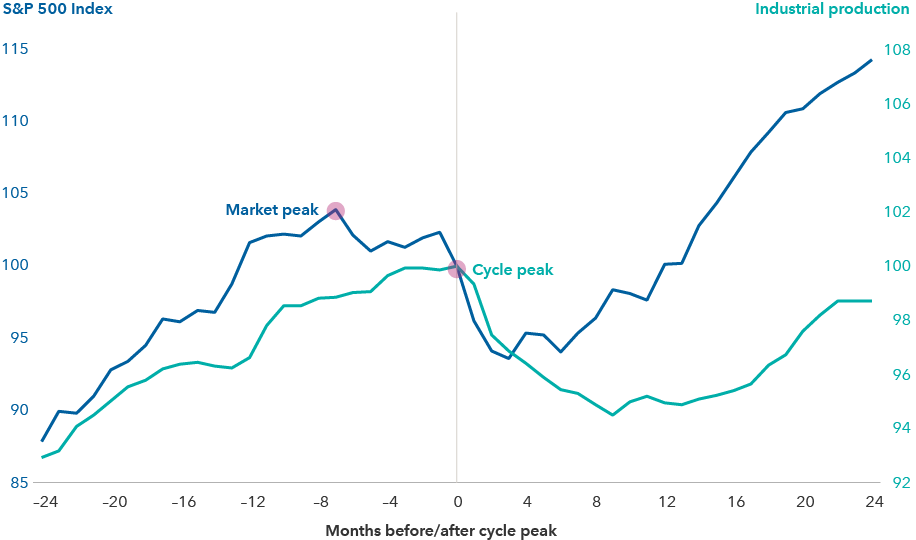
Sources: Capital Group, Federal Reserve Board, Haver Analytics, National Bureau of Economic Research, Standard & Poor's. Data reflects the average change in the S&P 500 Index and economic activity (using industrial production as a proxy) of all completed economic cycles from 1950 to 2022. The “cycle peak” refers to the highest level of economic activity in each cycle before the economy begins to contract. Both lines are indexed to 100 at each economic cycle peak and indexed to 0 “months before/after cycle peak” on the x-axis. A negative number (left of the cycle peak) reflects the average change in each line in the months leading up to the cycle peak. The positive numbers (right of the cycle peak) indicate the average changes after the cycle peak. Past results are not predictive of results in future periods.
Still, aggressive market-timing moves, such as shifting an entire portfolio into cash, can backfire. Some of the strongest returns may occur during the late stages of an economic cycle or immediately after a market bottom. An averaging strategy, in which investors systematically invest equal amounts at regular intervals, may be beneficial in down markets. This approach allows investors to purchase more shares at lower prices while remaining positioned for when the market eventually rebounds.
5. What economic indicators can warn of a recession?
Wouldn’t it be great to know ahead of time when a recession is coming? Despite the impossibility of pinpointing the exact start, there are some generally reliable signals worth watching closely in a late-cycle economy.
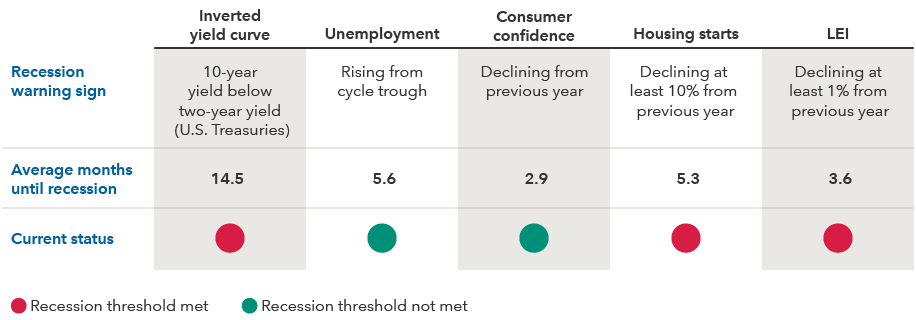
Sources: Capital Group, Refinitiv Datastream. Reflects latest data available as of 31/8/22.
Many factors can contribute to a recession, and the main causes often change. Therefore, it’s helpful to look at different aspects of the economy to assess where imbalances may be building. Keep in mind that any indicator should be viewed more as a mile marker than a distance-to-destination sign.
Four examples of economic indicators that can warn of a recession include the yield curve, unemployment rate, consumer confidence and housing starts. Aggregated metrics, such as The Conference Board Leading Economic Index® (LEI), which combines 10 different economic and financial signals into a single analytic system to predict peaks and troughs, have also been consistently reliable over time.
These factors paint a mixed picture. Whereas the yield curve and LEI indicate that a broader recession could still be looming, a resilient consumer and robust labor market tell the opposite story. The housing industry has essentially already fallen into recession and may be on the verge of recovery, which could lift the entire economy. New economic data can quickly change the narrative though.
6. Are we in a recession?
While at times it may have felt like we were already in one, we believe an official recession has yet to begin. Our base case remains that we will have a relatively short and mild recession, but the odds have increased that we won’t get one at all. Despite the impact that high inflation and rates have had on consumer sentiment and corporate earnings, the labor market has been surprisingly resilient and continues to support the economy.
The likelihood of a recession rose sharply in recent months
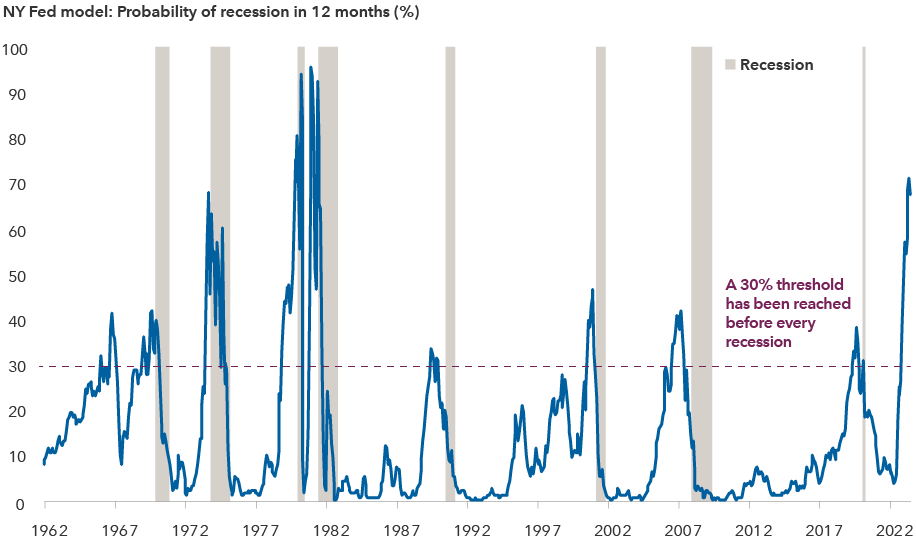
Sources: Federal Reserve Bank of New York, Refnitiv Datastream. As of 31/7/23. Shaded bars represent US recessions as defined by the National Bureau of Economic Research.
Instead of an official recession, what we may see is a continuation of a rolling recession, where parts of the economy contract and recover at different times. Housing had a slowdown deeper than many past recessions and has started to bounce back. Likewise, the semiconductor industry has recovered strongly from a sharp contraction in 2022. If certain sectors continue to go up while others go down, it increases the possibility of avoiding a broad recession.
Of course, other factors could potentially darken the near-term outlook. A weakening labor market or geopolitical shock — such as an escalation of the war in Ukraine — could quicken the timeline for a US recession.
7. How can investors position a stock portfolio for a recession?
We’ve already established that equities often do poorly during recessions but trying to time the market by selling stocks is not suggested. So should investors do nothing? Certainly not.
To prepare, investors can take the opportunity to review their overall asset allocations, which may have changed significantly during the bull market, to ensure portfolios are balanced and diversified.
Through 10 declines, some sectors have finished above the overall market
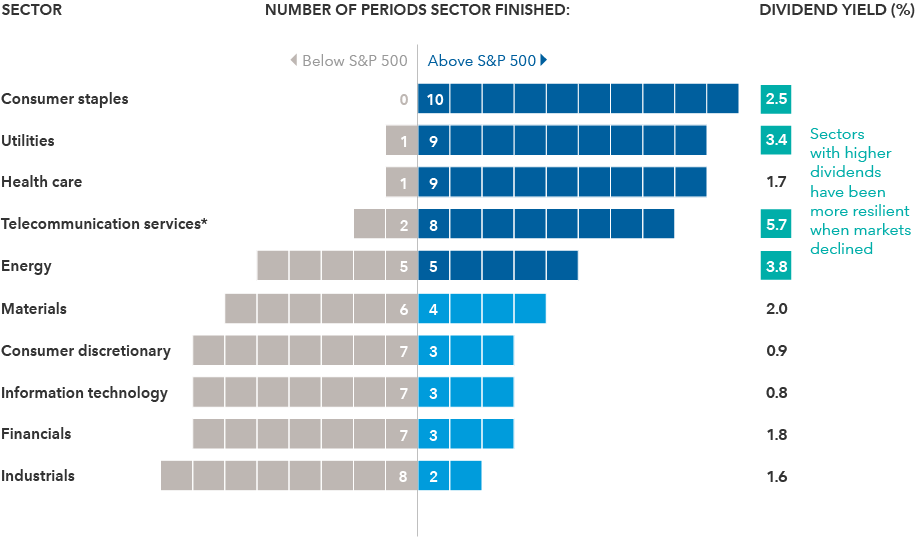
*In September 2018, the telecommunication services sector was renamed communication services, and its company composition was materially changed. The dividend yield shown is for the telecommunication services industry group, a subset of the newly constructed communication services sector. The communication services sector’s dividend yield was 0.8% as of 8/31/23.
Sources: Capital Group, FactSet. Includes the last 10 periods that the S&P 500 Index declined by more than 15% on a total return basis. Sector returns for 1987 are equally weighted, using index constituents from 1989, the earliest available data set. The 2022 bear market is still considered current as of 31/8/23 and is included in this analysis. Dividend yields are as of 31/8/23.
Not all stocks respond the same during periods of economic stress. In the eight largest equity declines between 1987 and 2022, some sectors held up more consistently than others — usually those with higher dividends such as consumer staples and utilities. Dividends can offer steady return potential when stock prices are broadly declining.
Growth-oriented stocks can still have a place in portfolios, but investors may want to consider companies with strong balance sheets, consistent cash flows and long growth runways that can better withstand short-term volatility.
Even in a recession, many companies may remain profitable. Focus on companies with products and services that people will continue to use every day such as telecom, utilities and food manufacturers with pricing power.
8. How can investors position a bond portfolio for a recession?
Fixed income is often key to successful investing during a recession or bear market. That’s because bonds can provide a measure of stability and capital preservation, especially when equity markets are volatile.
The market selloff in 2022 was unique in that many bonds did not play their typical safe-haven role. But in the seven previous market corrections, bonds — as measured by the Bloomberg US Aggregate Index — rose four times and never declined more than 1%.
High-quality bonds have shown resilience when stock markets are unsettled
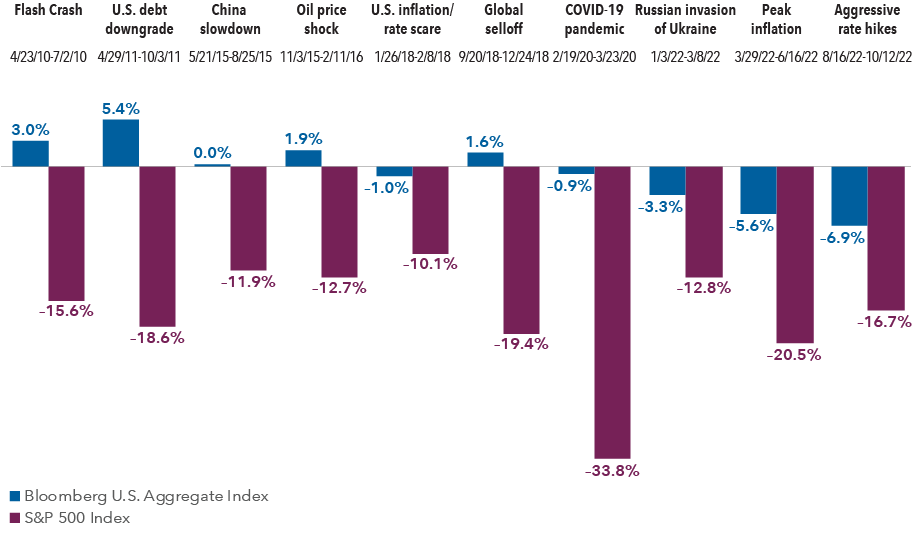
Sources: Bloomberg Index Services Ltd., RIMES, Standard & Poor’s. Dates shown for market corrections are based on price declines of 10% or more (without dividends reinvested) in the S&P 500 with at least 50% recovery persisting for more than one business day between declines. Includes all completed corrections between 1/1/10 and 31/8/23. Returns are based on total returns in USD. Past results are not predictive of results in future periods.
Achieving the right fixed income allocation is always important. But with the economy entering a period of uncertainty, it’s especially critical to focus on bond holdings that can help provide balance to their portfolios. Investors don’t necessarily need to increase their bond allocation ahead of a recession, but can review their exposure to ensure it is positioned to provide diversification from equities, income, capital preservation and inflation protection — what we consider the four key roles fixed income can play in a well-diversified portfolio.
9. What are ways to prepare for a recession?
Above all else, investors should stay calm when investing ahead of and during a recession. Emotions can be one of the biggest roadblocks to strong investment returns, and this is particularly true during periods of economic and market stress.
If you’ve picked up anything from reading this guide, it’s probably that determining the exact start or end date of a recession is not only difficult, but also not that critical. What is more important is to maintain a long-term perspective and make sure portfolios are appropriately balanced to benefit from periods of potential growth, while being resilient enough to minimise losses during periods of volatility.
Our latest insights
RELATED INSIGHTS
Past results are not predictive of results in future periods. It is not possible to invest directly in an index, which is unmanaged. The value of investments and income from them can go down as well as up and you may lose some or all of your initial investment. This information is not intended to provide investment, tax or other advice, or to be a solicitation to buy or sell any securities.
Statements attributed to an individual represent the opinions of that individual as of the date published and do not necessarily reflect the opinions of Capital Group or its affiliates. All information is as at the date indicated unless otherwise stated. Some information may have been obtained from third parties, and as such the reliability of that information is not guaranteed.
Capital Group manages equity assets through three investment groups. These groups make investment and proxy voting decisions independently. Fixed income investment professionals provide fixed income research and investment management across the Capital organization; however, for securities with equity characteristics, they act solely on behalf of one of the three equity investment groups.
 Jared Franz
Jared Franz
 Darrell Spence
Darrell Spence